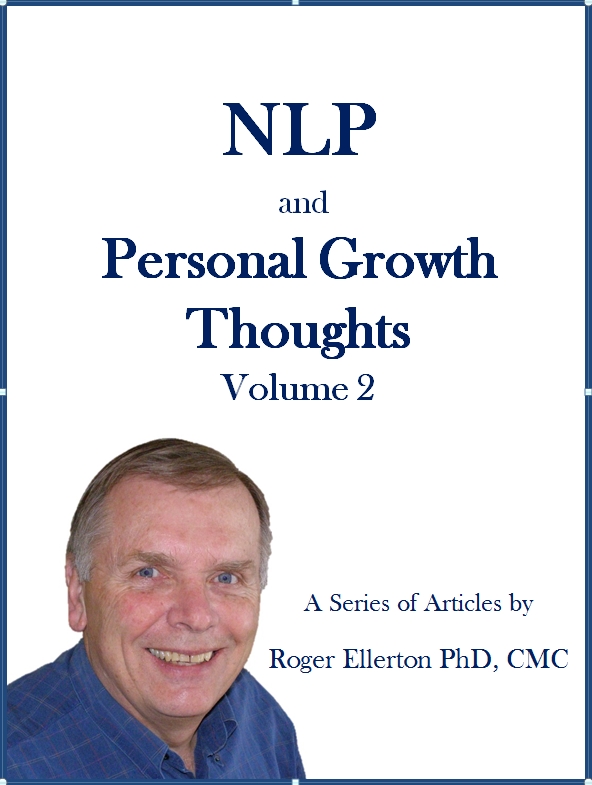NLP Presuppositions, Part II
By Roger Ellerton Phd, ISP, CMC, Renewal Technologies Inc.
This article may not be republished without written permission from Roger Ellerton/Renewal Technologies Inc. If you republish this article without permission, you will be in violation of copyright law and sent an invoice. You may share this and other pages with your friends by linking directly to this page from your website or blog.
The foundation for NLP is a set of presuppositions (beliefs) about ourselves and the world we live in. These presuppositions also serve as principles to guide how we live our lives. For an introduction to NLP Presuppositions, please see the article NLP Presuppositions, Part I. This article presents five more NLP Presuppositions and two suggestions how you can use them in your life.
1. The meaning of communication is the response it produces.
Your intended communication is not always what is understood by the other person. It does not matter what your intention is, what matters are the results you generate from your words, tone of voice, body language, ... .
Being flexible, you can change how you are communicating until you achieve your desired result.
Consider the following situation. I am a man and I notice a female co-worker has a new dress and I decide to pay her a complement (my intention). I say to her "Gee you look terrific in that dress." She immediately gets mad and leaves the room. I do not know what is going on in her mind, but obviously she heard my message very differently from what I intended. Maybe in her model of the world and through her filters, she felt I was 'hitting on her'. The next time I see her, I could continue with the same behaviour and think all sorts of bad things about her. Or I can realize that I did not achieve what I intended and find different ways to communicate with her so that we can have a productive working relationship.
2. There is no failure only feedback.
You try something and it doesn't work out the way you planned. How often do you interpret this as failure? Or maybe, it is simply information that you can use to change what you are doing in order to move closer to the result you want.
I have not failed. I've just found 10,000 ways that won't work. Thomas Alva Edison, Scientist and Inventor
How would your life change if you viewed failure as simply feedback - an opportunity to learn how not to do something and be flexible in developing a new way to achieve your intended outcome?
How different would work be if failure was viewed as feedback. Would you and others be more inclined to explore new ways to get your work done more efficiently and effectively, with more fun?
It is better to have enough ideas for some of them to be wrong, than to be always right by having no ideas at all. Edward de Bono
3. Every behaviour has a positive intention.
No matter how strange, hurtful or inappropriate a person's behaviour may seem to you; to the person engaging in that behaviour, it makes sense in their model of the world. They see the behaviour as the best or only way of meeting their need or achieving their outcome.
Similar ways to express this presupposition are:
- Everyone is doing the best they can with the resources available to them.
- Every behaviour is useful in some context.
- Everyone is always doing what they believe is right.
- This is the best choice available to a person given the circumstances as they see it.
The key is to appreciate the positive intention of the other person's behaviour. This does not mean that you view the other person's behaviour as positive. On the contrary, you may find it quite distasteful. You need to look behind their behaviour to notice their positive intention - for them, for you, for someone else, ... . Once you have an understanding of their positive intention, explore alternative ways to help the person achieve it.
As a example, assume you are having a discussion with someone and they begin to raise their voice, yell, knock things off the table and run from the room. From your perspective, this certainly is not viewed as positive behaviour. Now look at it from the other person's perspective. What could possibly be the positive intention behind this behaviour? Maybe they did not feel safe or felt overwhelmed in the conversation with you. Given the resources they had available to them at that moment, this was the only option they had to get some space or flee to a place of safety. Assuming this is the case, the next time a similar situation arises is there something you could do to help them achieve their positive intention in a different way that would assist you in achieving your outcome at the same time?
Could you use this approach to improve your relationship with you boss? Your co-workers? Your family?, Your children?, Your spouse?, ... .
4. There are no unresourceful people, only unresourceful states.
This presupposition is similar to the previous one.
People already have the resources they need to succeed. Sometimes they get themselves into a state of mind (overwhelm, sad, anger) that prevents these resources from being readily available. As a person with NLP training, you can help yourself and others to learn how to access these resources when required.
5. You are in charge of your mind and therefore your results.
You are the one who chose the filters (beliefs, values, decisions, ...) that determine your maps, your model of the world and how you experience different events. You are also the one who can change these filters to gain a different perspective on the world and potentially significantly different results.
To sum up, you can simply read the above presuppositions or you can begin to put them into action by making them a way of life. In so doing, you have the opportunity to change your reality, your results and your life! Here are two ways you may wish to consider:
- Begin to incorporate these presuppositions into your life by selecting a different presupposition each day. Read it over carefully and during the day, at work and at home, notice when this presupposition applies and what other courses of action are available to you to achieve what you want in life.
- Identify a situation in the past in which you did not perform as well as you could have. Take each presupposition one at a time and review the situation from each of these perspectives. As you do, notice what you can learn about yourself, about others and what other choices are available to you to obtain a different result - should a similar circumstance arise in the future.
And NLP is Much more than that!
Author: Roger Ellerton is a certified NLP trainer, certified management consultant and the founder and managing partner of Renewal Technologies. The above article is based on his book Live Your Dreams Let Reality Catch Up: NLP and Common Sense for Coaches, Managers and You.
Copyright © 2003, Renewal Technologies Inc. All rights reserved.








